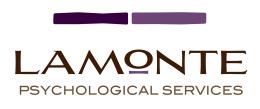Parent-Child Interaction Therapy (PCIT)
Parent-Child Interaction Therapy (PCIT) is a treatment for children ages 2 to 7* with behavioral problems. The PCIT method has been proven to be effective through 30 years of research. PCIT is a unique therapy that uses live coaching to help parents manage and reduce difficult child behaviors such as:

- Talking back
- Not listening
- Tantrums
- Aggression
- Hyperactivity
- Attention problems
- Whining
- Biting
- Anger
- Poor manners
- Interrupting
- Attention-seeking behaviors
- Anxious/clingy
- Behavior problems at school or daycare
- Difficulties that arise after parents separate or divorce
More about PCIT…
PCIT is designed to be a short-term treatment of 12 to 20 weekly sessions. One or both parents can participate in sessions. Foster and adoptive parents may also participate in PCIT. Parents who regularly use the skills outside of sessions will quickly notice improvements in their child’s behavior. Other benefits of PCIT include a better relationship with your child and less parenting stress. Parents and children who complete PCIT will see lasting results that will help children succeed in the future.
LaMonte Psychological Services uses the full research-supported PCIT protocol to ensure that parents and children get effective results. Dr. LaMonte has met the training requirements as a PCIT therapist and trainer as outlined by the PCIT Training Committee of the National PCIT Advisory Board. She also participates in ongoing education and training in PCIT. Dr. LaMonte is the only provider in Arizona trained by the UC Davis PCIT Training Center.
Contact LaMonte Psychological Services for a consultation to see if PCIT is a good fit for you and your child!
*Parent Child Attunement Therapy (PCAT) is also available for parents and children 12 to 30 months
Check out the videos and articles below to learn more about PCIT.
VIDEOS
PCIT featured on NBC’s Today Show
PCIT featured on the Baltimore News
ARTICLES
